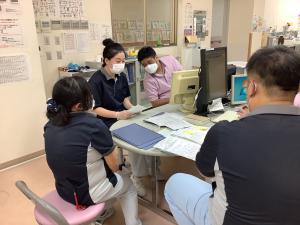本文
medical corporation DAIWA-KAI SEIMOU HOSPITAL
Full personnel intake support allows you to feel at ease in working even if you have no actual experience in nursing care!
Corporate information
Business Category: Hospital/Integrated Facility for Medical and Long-term Care
Location:Tomioka City
Number of Employees: 568, out of which 26 are non-Japanese personnel
Status of Residence: 3 with “nursing care” status, 21 specified skilled workers, 2 technical interns
Nationalities: Vietnam, China
URL:https://www.seimou.org/
Description of work, Experience in taking in non-Japanese human resources
As a local hospital specializing in mental care and medical care for the elderly, Seimou Hospital offers medical and nursing care services to patients suffering from mental illness and dementia and elderly individuals. Having started taking in non-Japanese human resources to serve as nursing care personnel in 2019, we have experience in hiring Vietnamese and Chinese nationals. Currently, we have 26 non-Japanese personal working at our various wards and at Middle Home Tomioka, a related facility.
A support network that allows non-Japanese personnel to live in Japan with peace of mind and adapt to their duties early on
We assist non-Japanese human resources so that they are able live in Japan with peace of mind and adapt to their work duties at an early stage.
For aspects of daily life, in addition to helping personnel get their life started through means such as arranging for housing and assisting them with moving and shopping, we provide support that enables them to live in Japan with peace of mind. This includes having a network in place that lets them consult with personnel in charge whenever they experience difficulties on or off the job and setting up programs that allow them take extended work leave of two weeks to temporarily return to their home countries.
Additionally, for work aspects, we provide support that enables non-Japanese personnel to adapt to their duties early on even if they lack actual experience in nursing care. This includes steps taken prior to assigning those personnel to a ward, which consists of implementing nursing care orientation training with the presence of more-experienced non-Japanese personnel and preparing ward manuals that incorporate photographs for ease of understanding by non-Japanese individuals as well.
Completing these is a system through which we shoulder the cost of training aimed at acquiring a care worker qualification and other expenses. Through this system, we also help ambitious non-Japanese personnel elevate their careers with a view to their future. We assist non-Japanese human resources so that they can feel at ease in going about their daily life in Japan and adapt to their work duties early on.
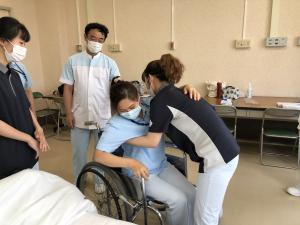
Scene from nursing care orientation training
Skills sought from non-Japanese human resources
Nursing care duties require meticulous communication between personnel and patients. For that reason, the minimal level of Japanese language ability for making that communication possible is needed. Additionally, for the purpose of building bonds of trust with patients, individuals capable of showing compassion to those patients through a considerable care-oriented mindset are sought.
State of activity of non-Japanese human resources
Nursing care is challenging work that necessitates bonds of trust with patients. However, thanks largely to the devoted approach of our non-Japanese personnel to that work, we are building sound relationships with our patients through those personnel.
Additionally, despite nearly all our non-Japanese human resources initially lacking actual experience in nursing care, they have developed the ability to conduct regular leader duties and night shifts in a short period of time. Among them are individuals who have even grown to the point where they oversee the instruction of new Japanese employees and serve as disaster prevention staff who lead disaster prevention drills in Seimou Hospital.
Our Japanese employees also receive positive stimulation from the manner in which our young non-Japanese personnel earnestly tackle their work duties, which translates into boosting their motivation in tackling their own work.
Scene from meeting duties
VOICE
Comments by Non-Japanese Staff【Tran Duc Tho(From Vietnam)】
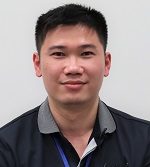 I am charge of areas that concern patients who require care at a nursing care hospital, including their meals, bathing, bathroom assistance and rehabilitation.
I am charge of areas that concern patients who require care at a nursing care hospital, including their meals, bathing, bathroom assistance and rehabilitation.
Originally, I worked as a technical intern trainee in the manufacturing industry. As such, I didn’t have any actual experience in nursing care. However, before I was assigned to my ward, nursing care orientation training was provided, and more-experienced Vietnamese personnel followed up by helping me with difficult specialized terms and the like. Plus, there was a work manual available that featured photos and other elements to make it easy to understand. As a result, I was able to quickly become accustomed to my job.
My work duties require both bonds of trust with patients and stamina, which makes it trying at times. However, I manage to enjoy my work each and every day thanks to the considerable kindness of my fellow workplace members and their proactive communication. I also feel great satisfaction in my work when patients convey their gratitude to me.
As I like Japan and feel satisfied with my current work, in the future, I hope to get certified as a care worker and do my part for Japan’s world of nursing care.
When living and working in Japan, it is important to have an advanced level of Japanese language ability and an understanding of Japanese culture and customs. For that reason, if you are considering working in Japan, I recommend that you study all the above before coming here.
Comments by Non-Japanese Staff【Dang Lin(From China)】
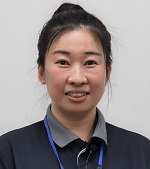 I oversee overall care duties at a nursing care hospital. I started working here in order to study Japan’s superior nursing care techniques and acquire a qualification as a care worker. My duties allow me to learn about appropriate methods of using the body and care equipment when providing assistance, among other things. Plus, because I work in concert with occupational therapists and other specialists, every day is a nonstop learning process.
I oversee overall care duties at a nursing care hospital. I started working here in order to study Japan’s superior nursing care techniques and acquire a qualification as a care worker. My duties allow me to learn about appropriate methods of using the body and care equipment when providing assistance, among other things. Plus, because I work in concert with occupational therapists and other specialists, every day is a nonstop learning process.
If you are considering working in Japan, I believe you will have an enriching daily experience here as long as you come armed with clear goals.
Additionally, this hospital provides full assistance with getting one’s life started in Japan, including housing arrangements and help with shopping. There is also a network at the ready that lets one consult with personnel in charge at any time should they encounter difficulties with their work or living situation. These are examples of how an environment is in place that makes it easy for non-Japanese human resources to work. In turn, this makes it possible for us to focus on work with peace of mind.
Other than work, Gunma Prefecture contains a wealth of famous hot spring resorts, such as Kusatsu and Ikaho. I look forward to going there once COVID-19 subsides.
In the future, I intend on becoming a certified care worker and either continuing to pursue nursing care work in Japan or returning to my home country and finding work in spreading Japan’s superior nursing care techniques.
Comments by Representative【Director Takeda Shigetoshi】
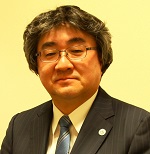 We support non-Japanese staff who seek to work at Seimou Hospital by creating an environment that enables them to tackle their work with peace of mind so that they can alleviate their concerns about living and working in Japan as much as possible and fully manifest their capability.
We support non-Japanese staff who seek to work at Seimou Hospital by creating an environment that enables them to tackle their work with peace of mind so that they can alleviate their concerns about living and working in Japan as much as possible and fully manifest their capability.
As Japanese staff, we also benefit from considerable positive stimulation from the manner in which our non-Japanese staff do their best to earnestly engage in their work duties.
If you should by chance work in this hospital after coming to Japan, I sincerely hope that you personally grow alongside us through the wonderful job of nursing care.
What do you say to beginning your career in Japan in the highly attractive prefecture of Gunma?


